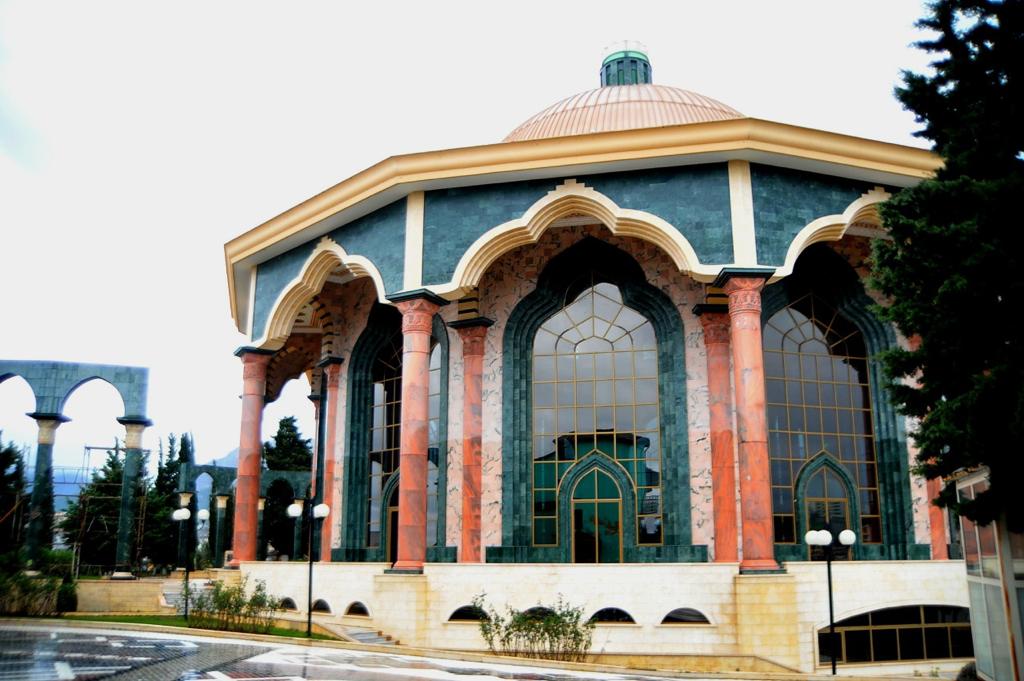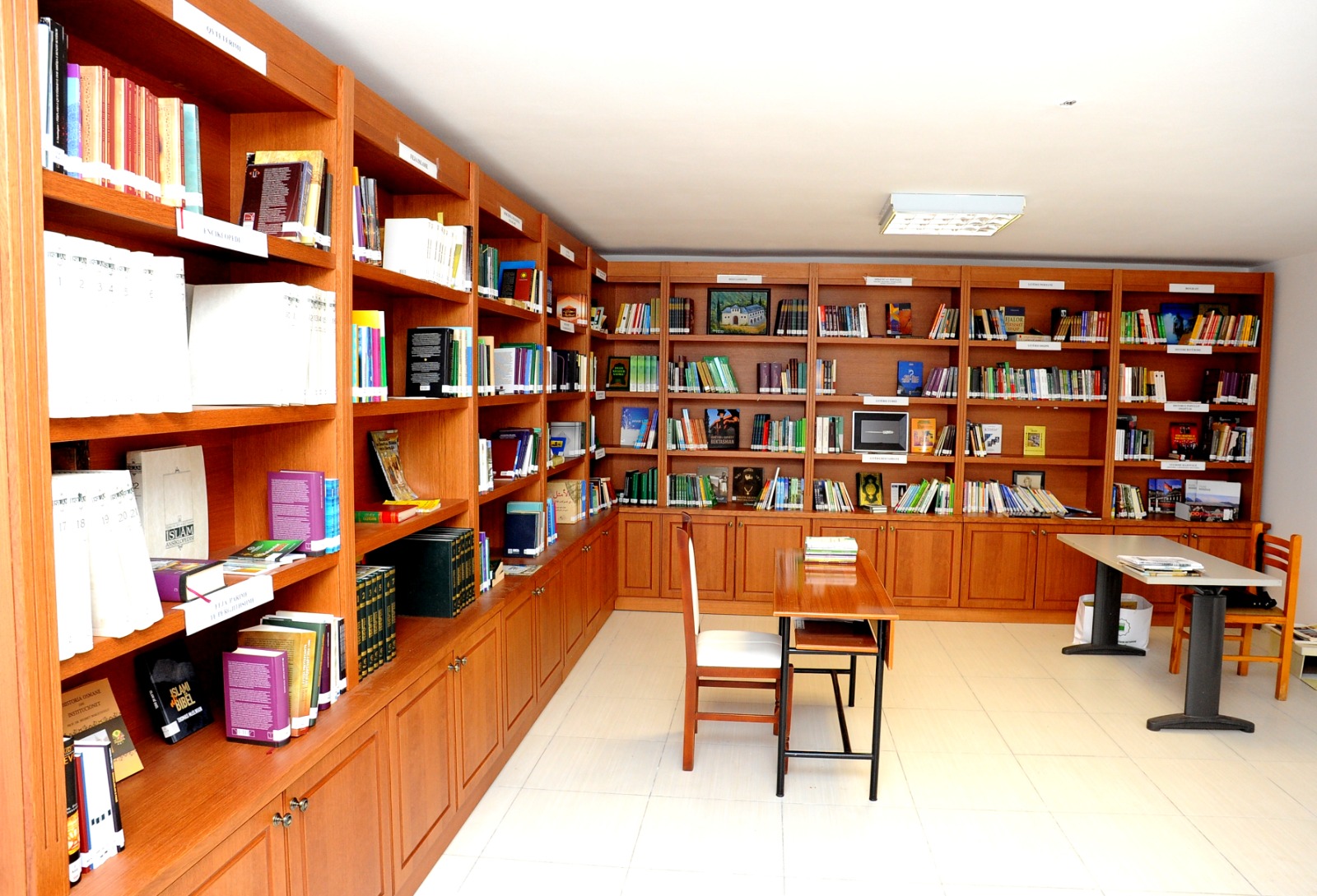Our Collections
1. The Library
The library of the Bektashi Seat starts its history with the opening of the Bektashi Headquarters in September 2015. The environment of the library comprises two reading halls with open shelves and the archives. This halls offer to the reader the possibility of working in a welcoming and communicating environment. The section for the Islamic religion and the Bektashi contains actual and retrospective works of Albanian and international researchers. It includes also Qurans in Albanian and other languages, philosophical and religious literature, mystics and rituals, monographs for the prophets and religious personalities, etc. One section contains Albanian and international books for children and teenagers. In order to accommodate the funds as best as possible and enrich them, the Library has been expanded with an area near the Headquarters. Bibliographic classification according to contemporary international standards has been carried out, following step by step the enrichment of the funds.
Go here for more information.
Collections
An important area of the collection are books with historical themes about Bektashism, literature on prophets and religion, educational works, biographies, monographic works about the culture, science, social life and similar topics. Another focus is works on the Albanian language and literature, translations of world literature, encyclopaedias, dictionaries, etc. A special contingent of the library collection are the annual Bektashi calendars, through which information with historical, cultural dates and events for the Bektashi Tarikat are conveyed. Periodical Albanian as well as international journals on Islam and mysticism can also be found here. Another important part of the collection are illustrated books with wide-ranging topics from history, the work of the important personalities of the Bektashi clergy and with topics and contents from art and culture. A special collection area is children’s literature with literary editions by Albanian and international authors.
Sections
The library’s entire book collection is arranged in 33 sections based on the Universal Decimal Classification (UDC). In each section, the copies are arranged alphabetically by author, or by title in the case of books without an author’s name. The library contains about 7000 copies. Enriching the collection as an essential process of library work remains a constant goal of the Bektashi Library, both through purchases by the institution itself and through donations.
Go here for more information.

Odeon, the multifunctional building of the World Center, with the Museum, Library, and Archives. © Photography by Nuri Cumani, Bektashi World Headquarter
2. The Archive
The Bektashi World Headquarters Archive collects, preserves and provides documents on the history of Bektashism in Albania and in the world in various languages such as Albanian, Arabic, Turkish, English, French, and Italian. The oldest document preserved in the archive of the World Headquarters dates back to 1847 (Prayers of Nasim Frakulla, written and sung by the Dervish Salih Tepelena). The material, the drafting technique and the language used vary and reflect to a large extent the specificities of the state and social development of the period in which they were created. Most of the documents have survived on paper, but also on photographs, image and sound tapes, diskettes and microfilms.
Data
The data in these documents provide a vivid overview of the organisation and functioning of the Bektashi faith over the years, the activities of world leaders, inter-religious coexistence, ceremonies and religious rites. At the same time, they provide important data on the history of our country and people, the war and the struggle for freedom and independence, the protection of Albanian territories, the development of the Albanian language, internal political, economic, social, cultural and educational developments, etc. The collection of documents from various sources is constantly being continued. With the completion of the first phase (collection), the phase of technical-scientific processing of the documents began. The aim of this preparation is to create access necessary for both studies and operational needs.
Property Documents
Priority number one was the property documents, as they play a crucial role in various legal procedures. It should be recalled that these legal procedures are necessary for the recognition of ownership of assets wrongfully confiscated by the communist regime after 1967. Today, 90% of these documents are accessible. In addition, documents reflecting various aspects of the Presidency’s activities from 1847 to 1996 are available to researchers. Aware of the importance of creating a complete repository for the history of Bektashism in Albania, all citizens who have documents are also invited to actively contribute to its enrichment.
Go here for more information.

Reading Hall 2 of the Library. © Photography by Nuri Cumani, Bektashi World Headquarter
3. Phototeque and Phonoteque
In 2015, a photo and film library (Phototeque) and a audio library (Phonoteque) were also established near the Odeon, the cultural and religious centre, together with the library, the museum, the archive. The rich photo collection depicts the activities of the Bektashi headquarters in various fields, the life of the Bektashi community, history, religious rites, efforts for education, culture, patriotism of the Bektashi clergy, inter-religious, inter-institutional and international relations, contribution to peace, etc. The photo library’s collection is currently being processed and classified according to technical and scientific standards.
The Phonotheque of the Bektashi World Seat researches, collects, edits and preserves various musical materials and recordings of the Bektashi musical traditions such as Nefese, Gazele, Ilahi, Divane, Mevlude, etc., which have been part of the Bektashi Tariqat since its origin. Over the centuries, the people have expressed their feelings, joy and sorrow, their inner world of faith through their verses and poems, pieces from their eons-long history. The themes of the songs, Bektashi Nefeses and Gazelle, reflect the people’s efforts for freedom, independence and for the Albanian language. Some Bektashi Nefeses and Gazele date back to the 13th century and their authorship is linked to the great names of Bektashi from Albania and other countries, such as Ynus Emre (1241-1320), Virani Sultan, Fuzuli, Naim Frashëri, Dalip Frashëri, Hasan Zyko Kamberi, Jusuf Myzyri, Ibrahim Hasnaj, etc.
Today, the Phonotheque is working on researching and collecting new materials by setting them to music and preparing them for editing as well as on their registration, digitisation and systematisation.
Go here for more information on the Phototeque.
Go here for more information on the Phonoteque.